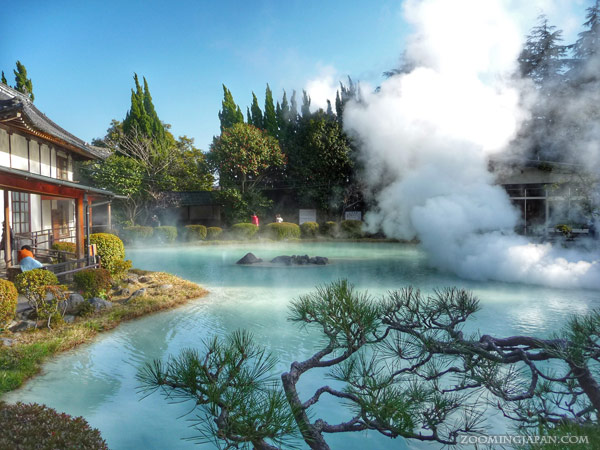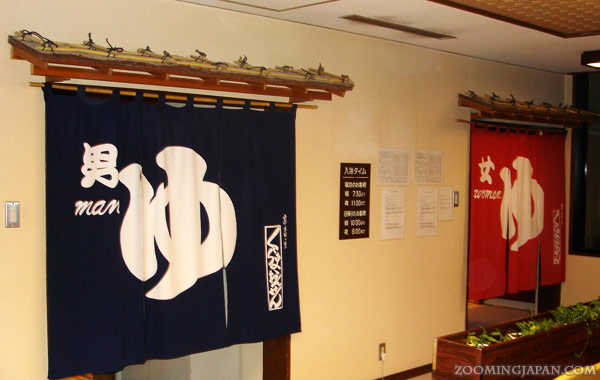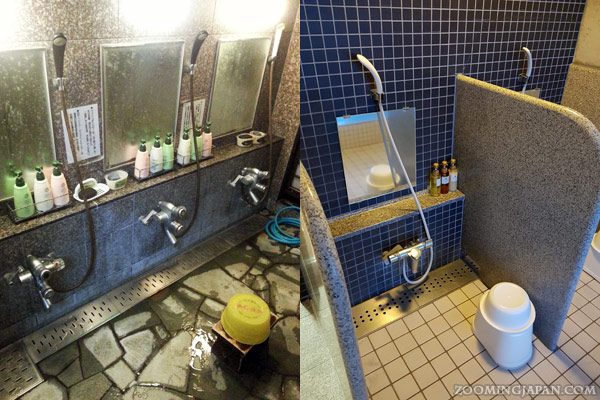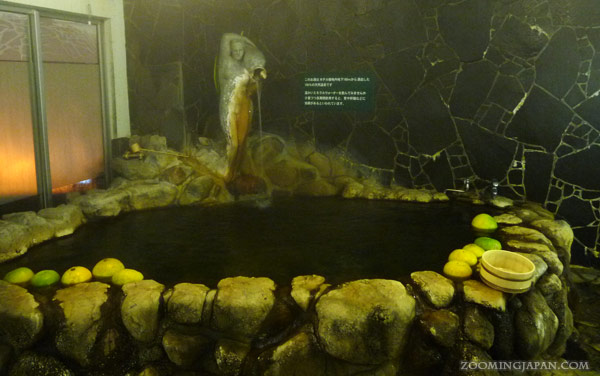Enjoying a Japanese hot spring is something you don’t want to miss when visiting the country.
Japan is blessed with onsen (温泉 / ♨) thanks to its many volcanoes. The hot water origins from geothermally heated springs. This is different from Japanese sento (銭湯) which are public bath houses, using normal hot tap water.
Although a lot of tourists are interested in learning more about Japan’s bathing culture, they’re worried about the rules.
Yes, there is something like an onsen etiquette in Japan and you definitely should learn about it before soaking in an onsen.
However, the rules are pretty simple, so don’t worry!

Onsen Etiquette #1: Don’t leave your hea… shoes on!
This rule is almost universal in Japan and not unique to hot spring facilities. Unless you are on a remote island, hopping into a deserted outdoor hot spring near the ocean, you most likely will have to take your shoes off right at the entrance of the facility. Most of the time, there are coin lockers or shoe boxes where you can put them.
Then proceed with slippers. They are usually provided right next to the shoe boxes.
If in doubt, just observe the Japanese people around you.
Onsen Etiquette #2: Don’t enter the wrong door!
The majority of onsen in Japan are not mixed gender, so you need to make sure you enter the correct entrance.
Or else this might be your last onsen visit.

Usually it’s very easy to differentiate.
The one for women has a red curtain-thingie with the kanji for woman (女).
The one for men has a blue one with the kanji for man (男).
There are mixed-gender hot springs, but they’re rare. If you want to avoid getting in such a situation, avoid hot springs that state “konyaku” (混浴, mixed bathing).
The only one I’ve ever been to required you to wear a white cloth, so you weren’t entirely naked.
It was within a shrine and you shall not be naked in front of the gods ….
In fact, that was at “Furusato Onsen”, my favorite onsen ever on Sakurajima (Kagoshima Prefecture, Kyushu). Unfortunately it doesn’t exist anymore. I heard they went bankrupt. I fear not enough people knew about this gem.
Onsen Etiquette #3: Don’t be afraid of getting naked!
I think most of you know this already, but for the majority of hot springs in Japan you need to be completely naked.
There are only a few exceptions. Also, if there is mixed bathing, men often cover up their most intimate parts and women can wrap around a towel. There are also onsen bathing suits called “yugi” (湯着) for women. I’ve only come across this once thus far for a rotenburo (露天風呂, outdoor bath) on a rooftop. It was to make sure nobody from the surrounding buildings could take a glance.
But this is rare. Usually you get completely naked.

Once you’ve entered through the correct door, you’ll be in a dressing room. Before entering the room, there’s a small entrance area where you’re supposed to take off your slippers!
Proceed to the room where you can take off your clothes and put your valuables in one of the baskets or – if available – a coin locker.
Sometimes they charge money, but the coin will usually be returned afterwards. Make sure to carry around 100 yen coins with you!
The key for the coin locker is attached to a wrist band that you’re allowed to take into the water with you.
Apart from that you can also take a small face towel with you. Nothing else.
Onsen Etiquette #4: Don’t enter without washing your body thoroughly first!
Before you’re allowed to enter the onsen which everybody shares, you’re supposed to wash yourself thoroughly.
Most facilities have showers with body soap, shampoo and conditioner (but you could also bring your own).

Make sure to rinse everything completely off before entering.
Most showers are Japanese-style with a stool where you can sit down. Make sure to clean everything around you, also the small stool once you’re done. Put everything back the way it was before.
If you have long hair, tie it up. Nothing should touch the water.
In case you brought a face towel, either place it somewhere outside the hot spring or wear it on your head.
You’ll see a lot of Japanese people who’re doing the same.
Some outdoor onsen don’t have shower facilities.
In that case, you don’t have to wash yourself before entering, of course.
There are some remote and natural hot springs out there with no facilities at all.
At some spots you can even dig your own onsen (e.g. Kawayu Onsen, Wakayama Prefecture).
Onsen Etiquette #5: Don’t stay in the hot water for too long
If it’s your first time in a hot spring, you might tend to soak in there for too long.
Once you feel extremely hot and dizzy, it’s already too late.
Most spas have different levels within the hot spring, so just sit on a stair or a stone – or get completely out for a while. You can also cool down a bit in the icecold water bath that most facilities offer.

This is why I personally prefer outdoor onsen. The wind outside will make sure you won’t get overheated easily and you can generally stay longer.
Onsen Etiquette #6: Don’t enter the dressing room dripping wet!
Once you think you’ve had enough and want to leave, you could take a shower yet again.
In fact, a lot of Japanese people don’t because they want to enjoy the healing power of the onsen water.
Depending on the type of onsen water, a lot of people decide not to rinse it off.
That’s up to you. There’s no rule.
However, before you enter the changing room, you have to wipe yourself as dry as possible.
Do not enter when you’re dripping wet!
For that, you should use your small face towel.
Back in the locker room, you can then dry off completely (with your lager towel).
Usually there are also (portable) fans that you can turn on and off to your liking. They will help you dry quicker.
Most facilities have facial cleansers, toners and also hair driers for you to use free of charge.
In case you rented a towel from the facility, make sure to return it. Usually there’s a basket / box within the dressing room where you can toss it.
Once you’re done, make sure you have all your belongings and just leave again.
Onsen Etiquette #7: Don’t turn off your common sense!
I suppose the following is needles to say, but:
- Don’t jump into the water, don’t swim.
- Don’t talk in a loud voice.
- Don’t bring drinks or anything else with you.
- Don’t enter when you’re drunk.
- Don’t smoke.
- Don’t stare – and certainly don’t touch other people.

Also, you’re not allowed to bring your camera or smartphone inside the hot spring. There are naked people around, so it’s a NG!
If you’re completely alone, of course nobody will care.
But most of the time there are other people around, so NOPE!
Onsen Etiquette #8: Don’t enter when you have tattoos?!?
You might already know this, but the majority of onsen in Japan deny access to people with tattoos.
This has to do with the Japanese mafia, the yakzua, who usually have tattoos.
Of course, nobody would assume that a non-Asian foreigner with tattoos could be related to the yakuza, but those are the rules … and rules in Japan always change very, very slowly.
If you only have a small tattoo, it’s possible to cover it with special make-up.
And nowadays there actually are hot spring facilities that allow tattoos – and they’re increasing! However, currently there are still only a few and you’re very limited in your choice.
5 Onsen Insider Tipps:
1. Yukata vs Western-style clothes
You often see Japanese people wear traditional wear such as yukata when they’re at an onsen resort.
If you stay in a ryokan with an onsen, they usually provide you such clothes. You’re allowed to walk around in yukata and slippers inside the hotel.
It’s more comfortable to wear that if you plan to enter the onsen, too.
In most onsen towns, you can also wear the yukata to hop from one onsen facilty to another.
If you’re a day visitor to an onsen facility, you just wear your normal clothes, no problem with that.
2. What should you bring with you?
If you plan to visit an onsen, take a small towel with you.
But don’t worry, the majority of onsen facilities sell or rent towels to you.
In case you’re at an onsen resort, they usually sell lovely towels as souvenirs in the shops on the streets. So, you’d rather want to buy one there as this is something you can definitely keep and use again.
The towels that hotels and spa facilities sell are usually very plain.

Make sure you have 100 yen coins with you for coin lockers, vending machines, massage chairs etc.
Have something to drink with you and place it in the dressing room.
You’re not allowed to drink anything while you’re inside the bath, but once you’re back in the changing room, it’s important to rehydrate yourself.
Depending on your skin care routine, you might want to use your own products. They also offer the most essential stuff (cotton buds, combs, cotton pads, tissues, cleansing oil, toner, lotion) in the dressing room. I usually only bring a body lotion with me as that’s something they don’t offer and my skin is very dry.
3. Onsen swapping time: Gotta enjoy them all!
At many bigger onsen facilities with a huge variety of hot springs, you usually can’t enjoy them all at once. During certain times of the day, some spas are only accesible for women, some only for men. They usually swap at least once a day. Just make sure not to stay in the hot spa too long or somebody of the other sex will suddenly appear in front of you. ;)
If you want to experience all the spas, it’s sometimes good to wait for a while or to come back later.
4. To shave or not to shave?!
To be honest, don’t worry too much about it. There’s really no rule and you’re already different by not looking Japanese.
However, if you’re concerned about it, let me tell you what’s common among Japanese people.
It’s not unusual that Japanese men are completely unshaved, even the armpits. However note that Japanese men are often far less hairy.
As a Japanese woman you’re not supposed to have any hair on your arms or legs or armpits. As Japanese women have fair skin and dark hair, some of them actually seem quite hairy. However, they all make sure to shave, wax etc. However, it’s not very common to shave the pubic hair (completely).
5: Girls’ special: What to do when you’re on your period?
If you’re on your period, you’re not supposed to go to a spa or a sauna.
The same goes for Japanese onsen.
I’ve run into this problem often myself. If you can’t re-schedule your onsen visit, then you’re in trouble.
You can either postpone your period by using a birth control pill. Although I only recommend this if you’re already taking it.
I’ve seen suggestions that say to just cut off the tampon string and whatnot. Don’t do that!…
There are menstrual cups and special tampons you can use in spas. That might be an option if you feel comfortable using them.
Don’t enter a hot spring when you’re on your period without any kind of countermeasurement! You’re sharing the onsen with others. Be considerate.

I’m a huge fan of onsen and unfortunately I’ve recently seen people (*Asian tourists) misbehave although the rules were stated clearly in the dressing room in several different languages. Don’t get too nervous about the etiquette and just use common sense. :)
I’m curious about your onsen experience!
What was the weirdest thing that happened to you? Were you nervous the first time?
Do you have any great tipps you want to share with us?
Don’t be shy and drop a comment below!~









Great article. Makes me want to soak in an Onsen right now! :-) I have a small addition about tattoos in Onsens. I have small (Compact Disc) sized tattoo on my shoulder and it has never be a problem for me entering an Onsen. I have visited larger Onsens but also smaller, more rural Onsens and it has never been a problem. I do however always try to cover it up a little bit with the face towel and when i am in the bath i try to hide it from plain view by facing my back against a wall. This has always worked for me even in Onsens where it explicitaly said “no tattoos” in Japanaese.
Hi Patrick,
As always, thanks a lot for sharing your experience. :)
I’m glad to hear that you never ran into any problems with your tattoo.
Did you usually check at the reception whether it was ok or not?
I usually checked it at the hostel i would stay since locals usually know these things best. And in my experience it’s usually easier to ask for forgiveness instead of permission in Japan. ;-) So i normally try to play a bit dumb about it when i am in the onsen haha. But always try to respect the culture by not showing off my tattoo. :-)
Also the Japanese go to an Onsen after skiing for a whole day. Nothing better than to soak in a hot bath and relax your boday after a day of hurtling down a snowy mountain. I would almost say it beats the Apres-Ski we have here. ;-)
May I add, it’s also awesome after hiking!
Basically whenever you’ve done some exercise and your body aches afterwards.
Onsen are so great. ^____^
Yeah it’s such a good feeling when you go into the bath and feel your tired body relax. And the sleepy feeling afterwards! :-)
Great post, this would have been so helpful when I went to Japan the first time!
I found many places that let me in despite my tattoos (not big, but not small) when I asked politely, in my experience the strictest are the largest structures (such as Oedo Onsen), luckily the ones I like less.
Hi Patrick,
I’m glad to hear that you didn’t run into any problems with your tattoos.
Don’t take your towel into the water. Japanese people often fold it up and put it onto their head (it’s a very small towel).
I was lucky enough to enter into a onsen and the gal who owned it didn’t mind my tattoo, despite the fact that after I left I saw the sign no tattoos!
That’s a beautiful picture of an onsen you posted under Etiquette#5. May I know the name and location of that Onsen?
Sure. I loved it there. That’s Shima Tamura Onsen (四万たむら) in Gunma Prefecture.
Great article! I know you mentioned this…but…body hair. As a guy with genetic predisposition for lots of hair should i be concerned or do anything to be respectful while at an onsen?
No, I don’t think so.
Just don’t be surprised to see a lot of Japanese guys with little to no body hair. ;)
Thank you so much! I’m traveling to Japan soon and I was totally stressing about Onsen rules and wondering about the whole shaving thing!
Haha, I can imagine. No need to worry and enjoy your trip.
I’m glad these tips were helpful. :)
For those with a tattoo and or something like my GF who had a mastectomy and are worried about visiting an onsen. There are (especially in “onsen towns” usually places with private onsen. Generally they can be found at Ryokan (for example they had many of them at Yamabiko Ryokan, where i visited). They have private entrance and a locking door. As it is private mixed gender / tatoo / etc are not a concern. It also provides the added bonus that you can enjoy the onsen with your loved ones.
I asked about my tattoo at a public onsen, before I went in. My tattoo is quite small. The woman looked at it, and kind of waved me through. In a fashion that suggested I was making a fuss about nothing. I think tourists with tattoos must be very common. I would think that Japanese people are getting tattooed more, these days.
thank you for your post for onsen
The best advice I was given about going to an onsen is, if you’re unsure what to do, take a quick peek at what others are up to.
I looked right at some of the people who were bathing, as I wasn’t sure how to do it. They didn’t seem to notice me looking.
Make sure you bathe, and wash all the soap off you, before you get in an onsen. It is assumed that no one will bring anything in that might contaminate things.
Some of the older women went in with their little white towels (washers) folded on their head. I did this, and it was handy to be able to use the towel when I got out of the onsen.
I checked that it was OK that I had a tattoo. They asked to see it. Mine is quite small. They were more than happy for me to use the onsen with it on show.
I live in Yokohama and was happy to find an onsen which allows tatoos (not that I have any) but there are always at least a couple of Japanese with full back tatoos (and fully shaved pubic hair). My wife said there were women with tatoos also.
I have never been troubled about my smoothness, but it was great to see Japanese (even without tatoos) shaved like me.